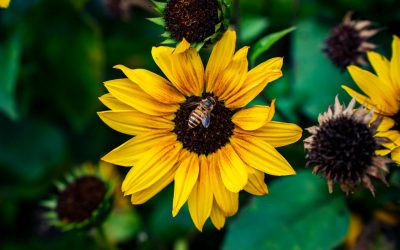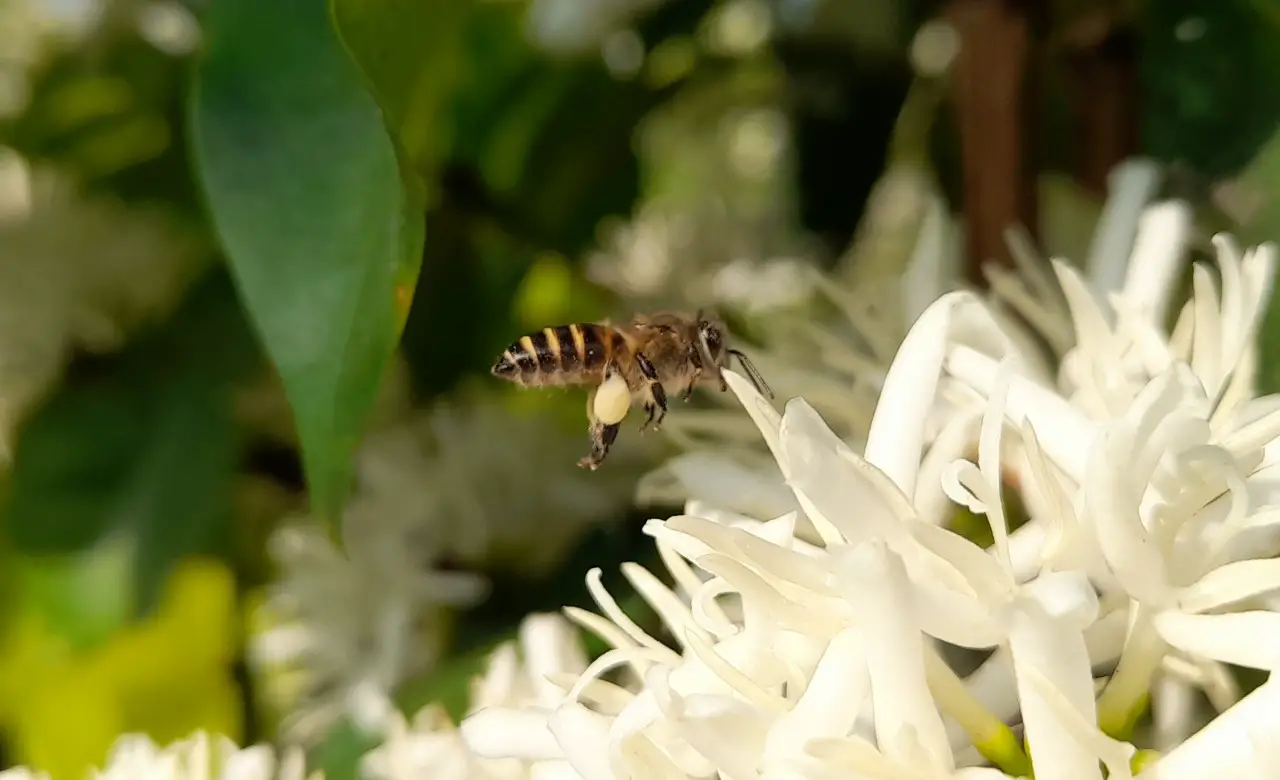Permaculture coffee farming
How to grow coffee and save the bees
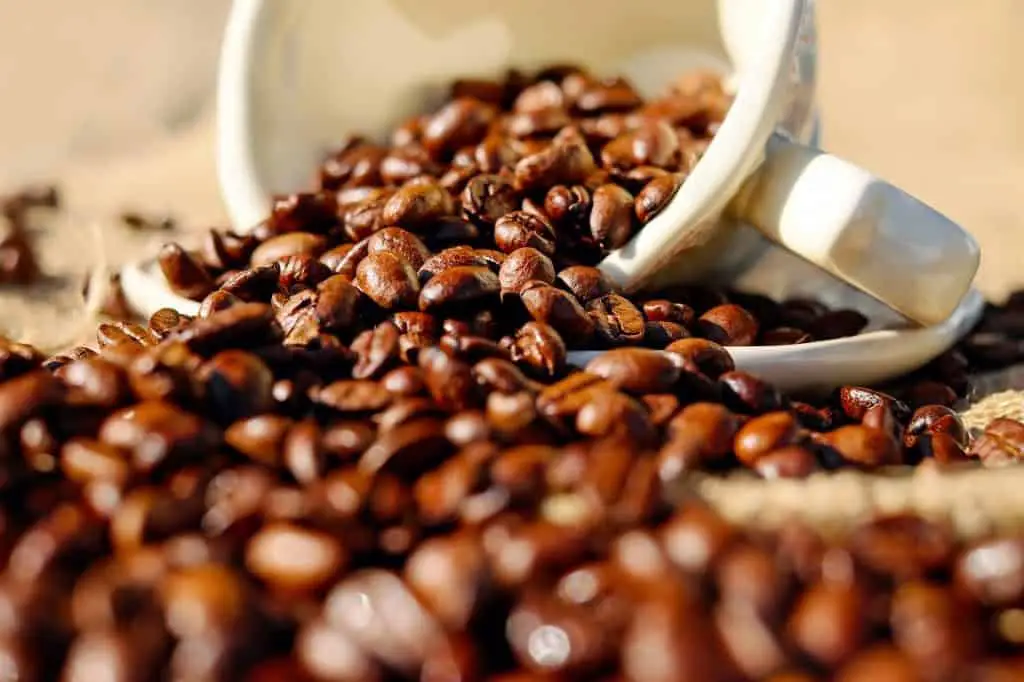
Roasted coffee beans. Make your morning great again.
Before we talk about permaculture coffee farming, let’s talk about the general notion of permaculture.
Permaculture is a forward-thinking design system based on principles found in nature. Its purpose is to create living environments that are harmonious, sustainable and productive; while greatly reducing the energy required to maintain them and enriching the soil over the years.
Regenerative farming, restoration farming, agroecology and biodynamic farming are closely related concepts.
In practice permaculture farms are organic, low-input, and biodiverse, and use techniques like intercropping trees, planting perennials, water harvesting, and very importantly, resource recycling.
Why are bees so important for coffee?
Coffee needs bees. Around 40 % of all coffee produced worldwide is Robusta Coffee. This kind of coffee variety relies on the help of pollinating insects, especially bees. On the other side, also bees can’t get enough of the seducing smell of coffee flowers! We write more on this topic in our article Coffee without bees?
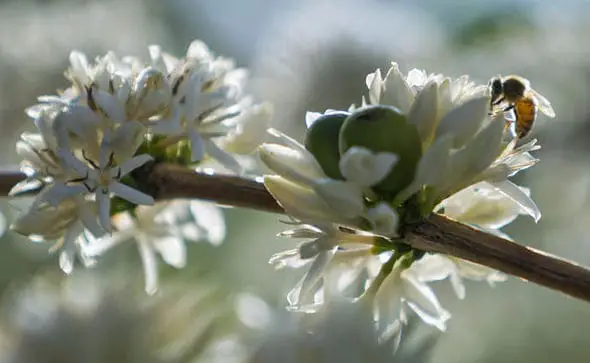
A bee diving deep into an ocean of coffee flowers.
Meanwhile, the presence of bees on the coffee farm increases the coffee production up to 40%. This fact alone should convince farmers to attract bees on their farms and keep their little bellies filled all year round.
One of these farmers is Bui Anh Tuan from Bui Farm, Vietnam.
Let’s explore with Tuan how a permaculture coffee farm looks like.
Also, what does Bui farm do to keep bees happy?
5 features of permaculture coffee farming
1) The power of biodiversity
The biggest plus that a farm or garden can possibly have is a great biodiversity. In this way, pests attacking a certain type of plant can never take over the whole farm. Likewise, a diverse environment offers living conditions for a variety of insects, including the predators of those pests. A natural balance is in place! Also bees benefit from those diverse living conditions: When they have access to flowering plants all year round, they will probably make your farm their home. Why on earth should they leave a paradise? Bui Anh Tuan from Bui Farm reveals that his coffee production increased up to 40% since wild bee nests settled on the farm.
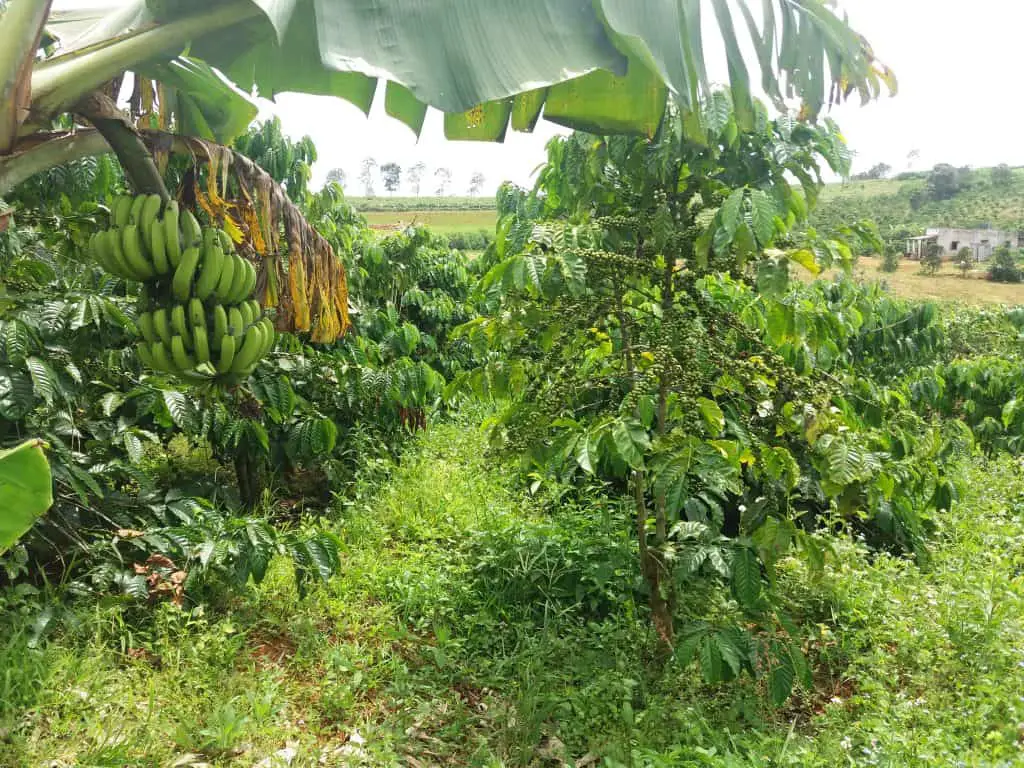
Banana palms among other fruit trees bring biodiversity on the coffee farm.
On a coffee farm in Vietnam biodiversity means intercropping coffee trees with fruit trees. On Bui Farm we find banana palms, jackfruit, durian, macadamia, dragonfruit and many other kinds in between the coffee trees. This has also two more advantages:
The fruit trees provide shade for the coffee trees during the dry season.
And secondly, they provide another source of income with the sales of organically grown fruit.
2) Embracing weeds, seeing a solution in every problem
Most farmers see weeds as a big problem and source of anger and despair. The common fear is that weed plants compete with your crops plants for nutrition from the soil. Yes, they do. Good news is that minerals don’t volatize and when weeds die, their stored nutrients go back to the soil.
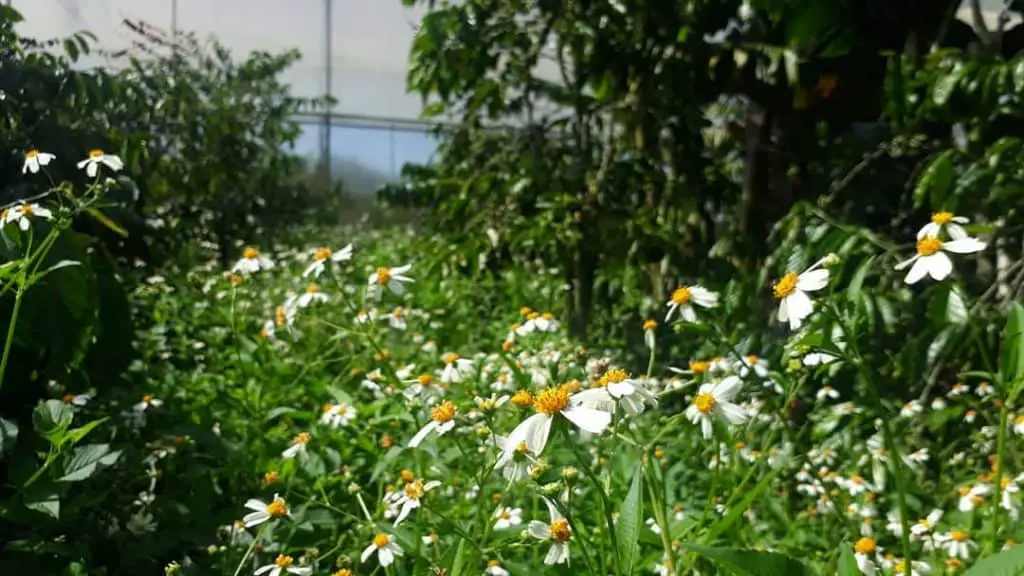
Endless daisy flowers between the coffee trees – a heaven for bees.
Bui Anh Tuan adds a little extra fertilizer (from his own production) and feeds both the crops and the weeds when they are growing up. Then he keeps the weeds to make bees and pollinators happy. When the coffee flowering or harvesting period is near, he practices the chop-and-drop method for the weeds. Cutting off the weeds and simply leaving the dead plants on the soil, the leaves first serve as mulch and prevent more weeds from growing. Secondly, the nutrients from the cut off plants will be given back to the soil.
Weeds give the opportunity to enrich our soils with organic matter – basically for free.
3) Natural fertilizer from animals living on the farm: cow manure and worm castings
Tuan produces all kinds of fertilizers on his farm: compost fertilizer from farm and kitchen waste (dry fermentation) and fermented organic waste (wet fermentation). In this way he can transform the so-called farm waste products into resources and achieve a closed circle production.
Still, the most important fertilizer input comes from animals. Farmers don’t have to raise their own animals, but Tuan tells you what the advantages are when you do.
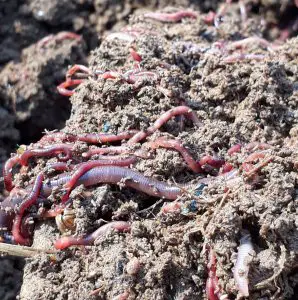
Worms: worlds finest compost makers
Cows produce precious manure and worms do excellent wormcastings, both being rich in nutrients to grow plants. We talk about food sources being fed to an animal, going throught their digestive systems and being later used on the plants.
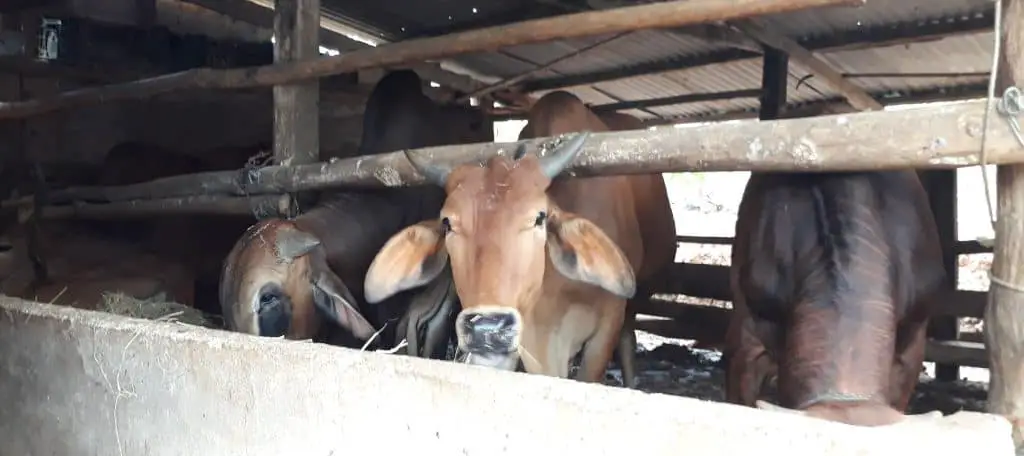
Cows at Bui Farm. Friendly and efficient in composting.
And here comes the first advantage: Since Tuan raises his own animals he has complete control over their feed, being the input for his future fertilizer! For example, he knows whether the cows receive medication or if the worms had a healthy worm diet.
Tuan composts cow manure, acting as nitrogen-loaded material, together with dry coffee husk, being the carbon material. Dry coffee husk is a waste product from coffee production. In this way, this coffee waste product is reused on the farm.
Bui Farm doesn’t need an external fertilizer supplier and keeps transport miles close to zero. Thumbs up!
4) An area dedicated to wildlife
Bui Farm confines with a small, untouched pine forest. These kinds of wildlife retreat areas are more important than you think! Why? Again, permaculture tries to mimic the dynamics of nature. If we have a wildlife area or a wildlife corridor on our farm, we give insects, birds, small mammals and many other animals a place to withdraw. A place to rise and shine.
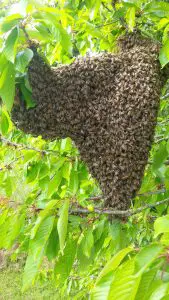
A bee swarm on a branch: searching for a quiet place to.. bee.
Bees, for example, can nest here and then head out to pollinate crops.
Birds will be happy to find a quiet place and then fly out and catch mosquitoes or other pests.
Bigger birds will come and eat smaller birds who eat our crops. And so on…
5) In-house processing & roasting: adding value and keeping control over quality
Caution: This might be a feature which is not exactly related to permaculture coffee farming. Yet, in the case of Bui Farm, in-house coffee processing and roasting is an essential key to success. As a result, we include it in the features of successful permaculture coffee farming.
Many coffee farmers (and most of the poor coffee farmers) don’t have a choice or don’t know about their choices, when it comes to selling coffee.
During harvesting season, the majority of coffee farmers harvests all coffee cherries, regardless of their ripening stage. As a result, they gather a mix of very ripe, ripe and very unripe coffee cherries. This kind of quality is not very high-priced, and so they make very little income, when they sell it.
On top of that, the unprocessed coffee cherry lands the lowest price in the coffee industry.
You wonder, what does Bui Farm do?
Bui Farm decided to invest in machineries for in-house processing and in-house coffee roasting.
Coffee processing: Bui Farm does honey processing and natural processing. They opted for 2 different processing methods to diversify their offer.
Honey processing is a method in which the coffee cherries are de-pulped, but allowed to dry without washing. Does it taste like honey? No :). It is called honey processing because most of the cherry is depulped, but the remaining golden mucilage looks like a honey glaze.
Differently, natural processing is drying the whole red cherries under sunlight about 15 to 20 days. The next step is using a machine specially made for depulping dry fruits. The end result of natural processing are green beans.
Green beans come in many different sizes. Therefore, Bui Farm uses a coffee sieve to sort the sizes according to quality standards.
Coffee roasting: They own a high tech coffee roaster. In this way, they can control the quality of the coffee. Why? Many traditional roasters (in Vietnam) do roasting in the ancient way. It means roasting the coffee bean until it is black. You can imagine, what a black roasted coffee bean tastes like. Yes! Very bitter. Anyway, this is not the case of the Bui Farm coffee. Here, Mr. Bui Anh Tuan himself takes full control of deliciously light and medium roasted coffee.

The roasting room. The bags are repurposed sugar bags transporting coffee in their new live.Direct sales: Most of the coffee is sold directly to end-customers. In this way, the coffee farm doesn’t need middlemen who take out their share of profit.
Coffee sales: Most of the coffee is sold directly to end-customers. In this way, the coffee farm doesn’t need middlemen who take out their share of profit. Bui Anh Tuan follows a strict standard of coffee freshness: He always advises you to buy only small quantities to receive the maxium level of freshness. This maximizes the taste and makes every morning great again!
Also, they do a couple of additional tricks guarantee a constant farm cashflow.
The best part? They share all of these tricks with us!
How to do permaculture coffee farming successfully: the additional tricks
1) Only red coffee cherries for high quality: Bui Farm exclusively harvests red cherries. When your coffee is made of red coffee cherries only, you will get a higher price. On the flipside, this meants they take more time for harvesting. Instead of one harvesting round, it might take 3 or 4 harvesting rounds.
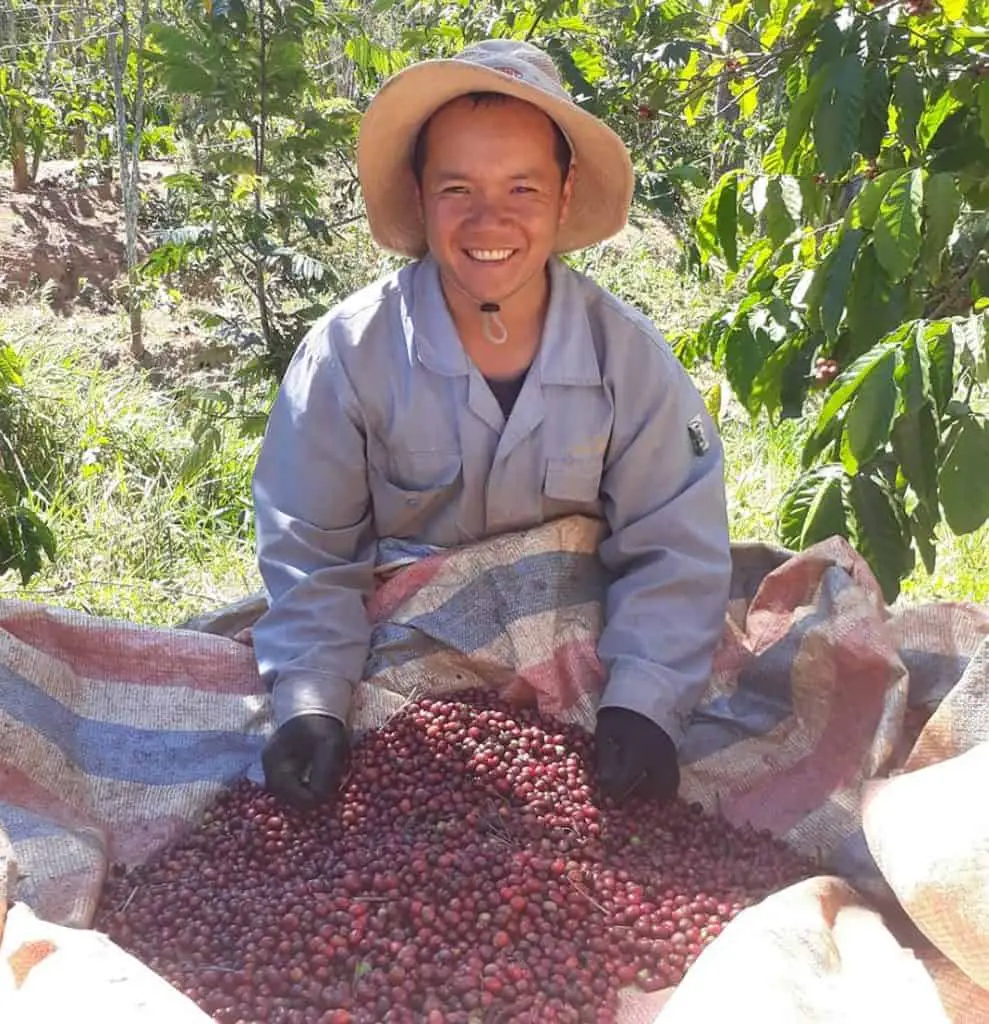
Bui Anh Tuan with red coffee cherries on a harvesting sheet.
2) Additional revenue from vegetables: Bui Farm has an organic vegetable market garden to cover 80% of the nutrional needs of the family. Any additional vegetables are sold to the next big city.
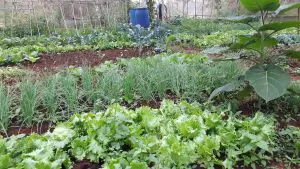
The vegetable garden at Bui Farm.
3) Additional revenue from eggs: The farm hosts about 100 happy, free-range chicken laying a constant, daily amount of eggs.
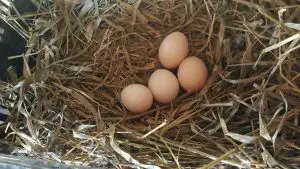
Fresh eggs – everyday.
4) Additional revenue from dried bananas and intercropped fruit trees: Since the farm is not a monoculture farm, it features also fruit trees, such as banana trees. The family dries the bananas with a professional drying machine and sells them. Whenever other fruits like avocados, macadamias, jackfruit, durians etc are ready to harvest, they make additional income.
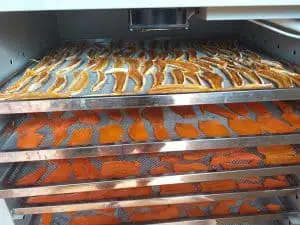
Slices of home-grown bananas in the dryer at Bui Farm.
Permaculture coffee farming is also about caring
There are two more things that we would like to mention:
Permaculture is also about caring. As you might know, the guiding ethics of permaculture are: People Care, Fair Share and Earth Care.
Following these guidelines, Bui Farm doesn’t harvest and doesn’t support harvesting honey from wild bees. With this statement, they go against a very popular tradition of its homecountry. Usually, honey hunters go for long walks in the woods to find wild bee nests. Sadly, most of these hunters don’t care much about those bees and gather whatever they can get, including the larvae, leaving no chance for the colony to survive.
Moreover, Bui Farm wants to see more permaculture coffee farming in this world, especially in its close proximity. To enable farmers to follow permaculture practices, Bui Anh Tuan gives farmers around him worm starters for free. Bui Farm loves to encourage others to learn and thrive with the exceptional benefits of worm farming.
If you have more suggestions or questions, reach out to Mr. Bui Anh Tuan through Facebook or send us an email.

